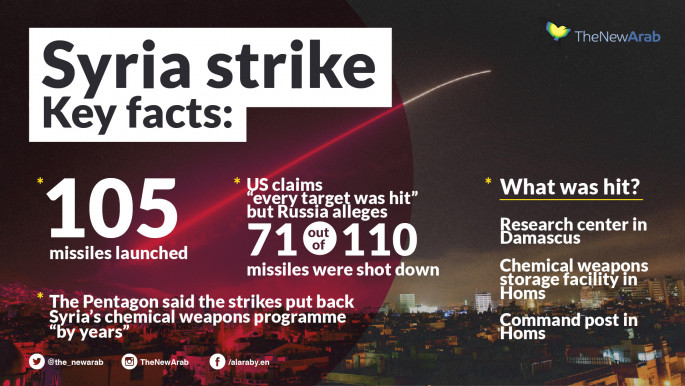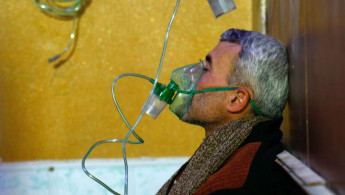Syria chemical attack probe stalls as regime 'hides evidence'
UN security experts are negotiating with Syrian regime and Russian authorities for international chemical inspectors to deploy at the site of an alleged toxic gas attack in Douma after a reconnaissance mission came under fire.
The team from the world's chemical arms watchdog has not yet been able to begin its field work in Douma, where dozens were killed in a suspected 7 April gas attack, as Western powers warn that President Bashar al-Assad's regime may attempt to remove crucial evidence.
The United Nations Department of Safety and Security (UNDSS) said it was trying to make arrangements for the fact-finding experts to travel to Douma "at the earliest possible time", according to a report to the Security Council obtained by AFP Wednesday.
"UNDSS in Damascus is now engaged in further discussions and coordination with representatives of the Syrian Arab Republic and the Russian military police on how to enhance and reinforce security arrangements in specific locations in Douma," it said.
A team from the Organisation for the Prohibition of Chemical Weapons arrived in Syria just hours after unprecedented US-led strikes on regime targets Saturday, launched in response to the alleged gas attack.
 |
|
But the watchdog on Wednesday said safety fears had hampered plans for the experts to travel to Douma, a town that was controlled by rebels until Russian-backed regime forces fully retook it last week.
The United States, France and Britain have accused Assad's regime of carrying out the suspected chemical attack, but Russia and Syria deny toxic gas was used in Douma.
According to the UN report, a security team travelled to two sites on Tuesday escorted by Russian military police.
At the second location, "there was an explosion followed by small-arms fire directed at (the) UNDSS team and the Russian military police," said the report, adding that the team had returned safely to Damascus.
OPCW chief Ahmet Uzumcu said the incident highlighted "the highly volatile environment" in which the fact-finding team had to work.
He added he would only consider deploying the team to Douma with UNDSS approval and if the inspectors had "unhindered access to the sites".
Syria's UN ambassador Bashar Jaafari told the Security Council on Tuesday that the OPCW experts would begin their investigation once they received the all-clear from the UN team.
Mission in doubt
Assad's regime in February launched a blistering assault on Eastern Ghouta, a semi-rural area within mortar range of central Damascus that had been in opposition hands for six years.
Fighters from the Jaish al-Islam group held out in the enclave's main town of Douma, but the group accused the regime of forcing them to accept a deal to leave the area by deploying chemical munitions in the 7 April attack.
Grisly footage purportedly of the aftermath shocked the world, with harrowing testimony from medics of victims gasping for air and frothing at the mouth.
It prompted a coordinated wave of missile strikes by the United States, France and Britain against regime targets.
Syria's ally Russia was given prior notice and the missiles struck mostly empty buildings, in what many analysts saw as a hollow move that allowed all sides to save face.
 |
Western powers warn that President Bashar al-Assad's regime may attempt to remove crucial evidence from the attack site |  |
The OPCW was awarded the Nobel Peace Prize in 2013 for its efforts to destroy Syria's chemical weapons stockpile.
Its inspectors have a mandate to determine the circumstances of the alleged chemical attack, but not to say who is responsible.
But delays and security fears have cast uncertainty over the current fact-finding mission (FFM).
"At present, we do not know when the FFM team can be deployed to Douma," the OPCW chief said.
Western ambassadors to the organisation accused the Syrian regime of obstructing the mission.
The French foreign ministry has said it is "highly likely that evidence and essential elements disappear from the site".
Several experts have said it was likely that Russian and Syrian forces that now control Douma have tried to remove or tampered with incriminating evidence.
'Hiding evidence'
The "White Helmets", a Syrian rescue force that works in opposition-held areas, said it was working closely with the inspectors.
"We provided information on the burial place of those killed in the chemical attack," its chief Raed Saleh told AFP.
The White Helmets and local medics were the main source of information in the wake of the alleged chemical attack.
Another member of the organisation said he was worried proof that toxic substances had been used was being tampered with, particularly the burial site.
"The regime is hiding all the evidence," said the member, speaking on condition of anonymity, adding it was "essential" the inspectors visit the site of the attack.
He said the victims were buried in the city's east. On Tuesday, Syrian state news agency SANA said a "mass grave" had been found there, but did not specify what had been done with the bodies.
Top Jaish al-Islam official Mohammad Alloush accused the regime on Wednesday of "erasing proof of the chemical (attack) in Douma."
He specifically accused them of "storming cemeteries in search of the victims of chemical substances".





 Follow the Middle East's top stories in English at The New Arab on Google News
Follow the Middle East's top stories in English at The New Arab on Google News
![Israeli forces ordered bombed Gaza's Jabalia, ordering residents to leave [Getty]](/sites/default/files/styles/image_330x185/public/2176418030.jpeg?h=a5f2f23a&itok=_YGZaP1z)

